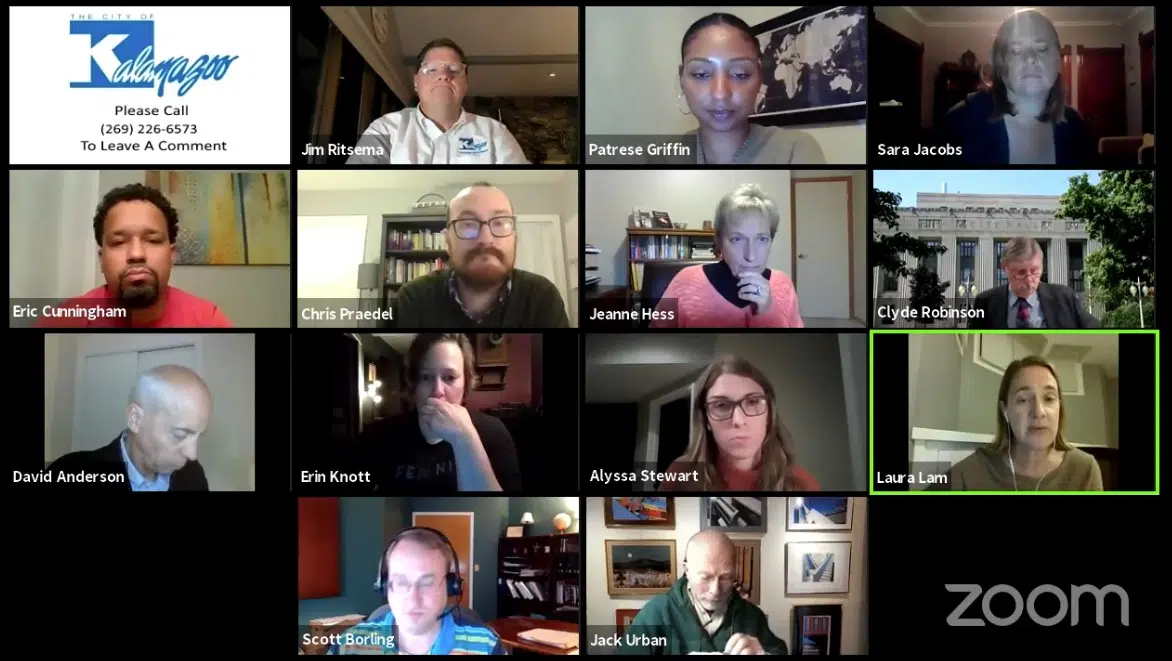KALAMAZOO, MI (WKZO AM/FM) — The Kalamazoo Board of Commissioners have voted to approve a Continuum of Care (CoC) Memorandum of Understanding with the United Way of Greater Kalamazoo & Battle Creek Region.
The memorandum was approved during a virtual meeting Monday night, at which time two programs designed to help curb homelessness were also announced. Officials say the goal of the partnership is to help address homeless-related issues in the community, including re-housing efforts, increased access to resources and programs, and more.
According to city documents, $450,000 have been allocated to do so as part of the memorandum. Documents specify the following facets of the plan:
Kalamazoo Continuum of Care Backbone Support ($100,000):
- To support the development of a robust CoC, a dynamic planning and collaborative body that will eventually work across the spectrum that spans from homelessness to affordable housing; to ensure the CoC operates within U.S. Housing and Urban Development (HUD) and Michigan State Housing Development Authority (MSHDA) guidelines and is able to successfully maximize funding from these sources to support CoC goals in Kalamazoo. Funds will support CoC staffing, including a Director, Associate, and Data Systems Administrator.
Landlord/Tenant Partnership Pilot ($240,000):
- The pilot program will cover security deposit costs for approximately 300 people with barriers to accessing housing (i.e. poor credit histories, criminal records, prior evictions, or low incomes); some will also receive an additional $1,000 in insurance coverage that landlords could draw against in case of unpaid rent, property damage, etc.
Vice President of Impact and Engagement for United Way Alyssa Stewart attended the virtual meeting to explain more details of the programs, starting with the landlord and tenant partnership.
“This pilot program will really be focused on covering security deposits,” Stewart said. “We’re hoping to serve upwards of 300 individuals with barriers to accessing housing,” Stewart said. “This program will really be focused on individuals who can afford housing…who have income of some kind, but may have other barriers to housing. We really hope this is a win-win, and we are partnering with the W.E. UpJohn Institute to study this pilot, and to use this pilot to help direct meaningful assistance to this population, who right now, doesn’t have a lot of options in our community.”
She said that a to-be-determined validated third-party company will cover the initial deposit, but done so in a way that will be “advantageous” to the program.
More details on this program can be found by viewing city documents at this link.
Low-barrier Shelter Conversion Support ($110,000):
- The low barrier shelter pilot will align the eligibility criteria, policies and practices with a Housing First approach so that any adult experiencing homelessness can access shelter without prerequisites, have access to voluntary services, and gain access to permanent housing. This pilot will leverage MSHDA Emergency Solutions Grant Coronavirus (ESG-CV) dollars which have made the master leasing of up to two houses possible to provide shelter for eight to ten individuals at a time.
“We currently have several encampments throughout the city, and we have street outreach teams right now that are housed at Integrated Services of Kalamazoo,” Stewart said. “They are out there interacting with and serving those individuals, and in many cases they are struggling to place them into more suitable or safe housing situations. In some cases it’s by choice, and in some cases it’s by a lack of places to go that meet that individuals’ needs. We are really excited to pilot 12 to 14 beds in what we call a ‘low-barrier shelter,’ which means that people can be in active addiction, they can be in active mental health crisis, and they can be placed in a safe shelter situation with social work support, and with all the great wrap-around services that Integrated Services of Kalamazoo can offer.”
The idea is to provide housing to the tenant first, and then “wrap-around” with whatever additional services an individual needs.
More information on that program can be found at this link.
Ultimately, the Memorandum of Understanding was approved unanimously, with Mayor David Anderson abstaining from the vote. More details about the application process for these programs are expected soon.









Comments